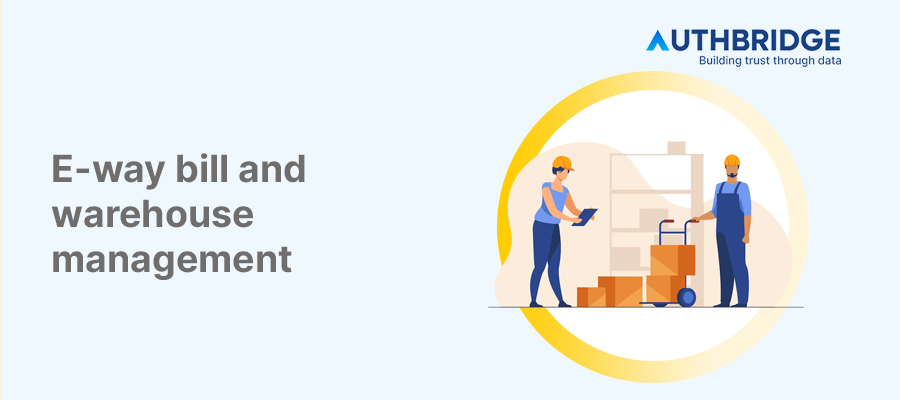E-Way Bill And Warehouse Management

The e-way bill (EWB) system, introduced in 2017, has significantly impacted how goods move within the country, influencing warehouse operations across various sectors. This comprehensive guide explores the interplay between EWBs and warehouse management, drawing data and statistics from official verified sources like the Central Board of Indirect Taxes and Customs (CBIC) website (https://www.cbic.gov.in/) and industry reports.
Understanding E-way Bills:
- An E-way bill is an electronic document required for the movement of goods exceeding ₹50,000 in value within India. It is generated on the e-way bill portal (https://ewaybillgst.gov.in/).
- The EWB captures details about the consignment, including:
- Supplier and recipient information
- Transporter details
- Description of goods
- HSN code (Harmonized System Nomenclature code)
- Value of the goods
Impact of E-way Bills on Warehouse Management:
1. Enhanced Efficiency:
- Improved stock control: EWBs facilitate accurate tracking of goods entering and exiting warehouses, enabling efficient stock control and inventory management.
- Streamlined documentation: Electronic EWBs eliminate the need for paper-based documentation, reducing administrative burdens and manual errors associated with physical documents.
- Faster movement of goods: Efficient EWB management can expedite the movement of goods through checkpoints, minimizing delays and improving logistics efficiency.
2. Increased Transparency:
- Audit trail: EWBs establish a clear audit trail for the movement of goods, enabling authorities to track the movement of goods for potential tax evasion investigations.
- Transparency in supply chain: EWBs create transparency in the supply chain by providing clear information about the origin, destination, and value of goods, allowing stakeholders to track their movement.
3. Regulatory Compliance:
- Simplified compliance: EWBs simplify GST compliance for businesses by providing a single document for the movement of goods, reducing the need for multiple documents and registrations.
- Reduced penalties: Timely generation and management of EWBs can help businesses avoid penalties for non-compliance with GST regulations.
Data and Statistics:
- According to a report by the Indian Warehousing Association (IWA), the Indian warehousing sector is expected to witness a CAGR (Compound Annual Growth Rate) of 9.2% from FY 2020-21 to FY 2024-25, reflecting the growing demand for efficient warehousing solutions.
- As of December 2023, the e-way bill portal statistics show over 14.5 billion EWBs generated, highlighting the widespread adoption of the system across various sectors, including warehousing and logistics.
Table 1: Impact of E-way Bills on Warehouse Management
Impact | Description |
Positive | Improved stock control, streamlined documentation, faster movement of goods |
Positive | Enhanced audit trail, transparency in supply chain |
Positive | Simplified compliance, reduced penalties |
Challenges and Solutions:
- Integration with Warehouse Management Systems (WMS): Integrating EWB generation and management functionalities with existing WMS can enhance efficiency and streamline data exchange.
- Training and Awareness: Ensuring all personnel involved in warehouse operations are trained on EWB requirements and procedures helps minimize errors and ensure compliance.
- Real-time Inventory Management: Implementing real-time inventory management systems can facilitate accurate data entry during EWB generation, reducing the risk of discrepancies.
Table 2: Challenges and Solutions for Integrating EWBs with Warehouse Management
Challenge | Solution |
Integration with WMS | Explore WMS providers offering EWB integration capabilities or utilize third-party EWB management solutions compatible with existing WMS. |
Training and Awareness | Conduct regular training sessions for warehouse staff on EWB requirements, procedures, and potential challenges. |
Real-time Inventory Management | Implement inventory management systems that provide real-time data on stock levels, facilitating accurate information input during EWB generation. |
Future Trends:
- API Integration: Expanding API integration capabilities between e-commerce platforms, logistics management systems, and WMS could further simplify EWB generation and data exchange.
- Blockchain Technology: Potential applications of blockchain technology in the supply chain can enhance security and transparency in EWBs and warehouse management processes.
Conclusion:
The e-way bill system has become an integral part of warehouse management in the Indian GST regime. By understanding the impact of EWBs and implementing effective strategies, businesses can leverage the benefits of:
- Enhanced efficiency in warehouse operations
- Increased transparency in the supply chain
- Simplified compliance with GST regulations
Recommendations:
- Stay Informed: Regularly monitoring updates and changes in e-way bill rules and regulations through official CBIC channels is crucial for maintaining compliance.
- Seek Professional Guidance: Consulting with qualified tax professionals can be beneficial for understanding specific EWB requirements and ensuring compliance in complex scenarios.
- Invest in Technology: Explore technology solutions like integrated WMS and real-time inventory management systems to streamline EWB processes and improve overall warehouse efficiency.
By embracing the impact of e-way bills and continuously striving for improvement, businesses can ensure smooth and efficient warehouse operations while navigating the evolving landscapes of both technology and GST regulations in India.
Disclaimer: The information provided in this blog post is intended for general informational purposes only and should not be construed as professional legal or tax advice. It is recommended to consult with a qualified tax professional for specific guidance on your business's warehouse operations and E-way bill requirements.
Category

Abhinandan Banerjee
(Associate Manager - Marketing)
Abhinandan is a dynamic Product and Content Marketer, boasting over seven years of experience in crafting impactful marketing strategies across diverse environments. Known for his strategic insights, he propels digital growth and boosts brand visibility by transforming complex ideas into compelling content that inspires action.



